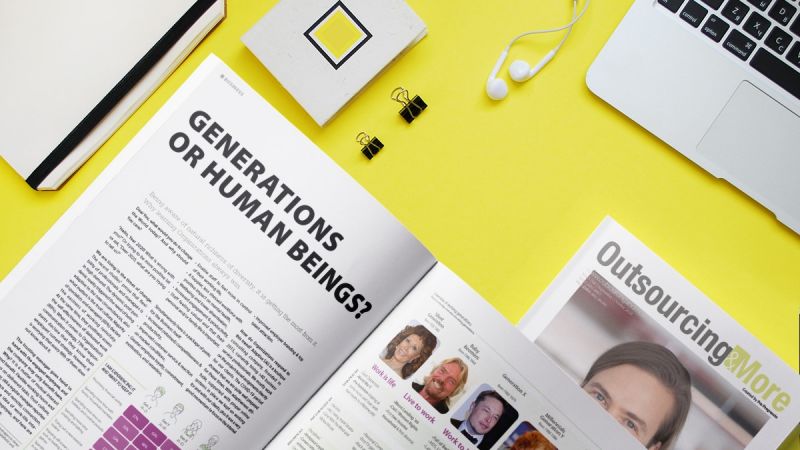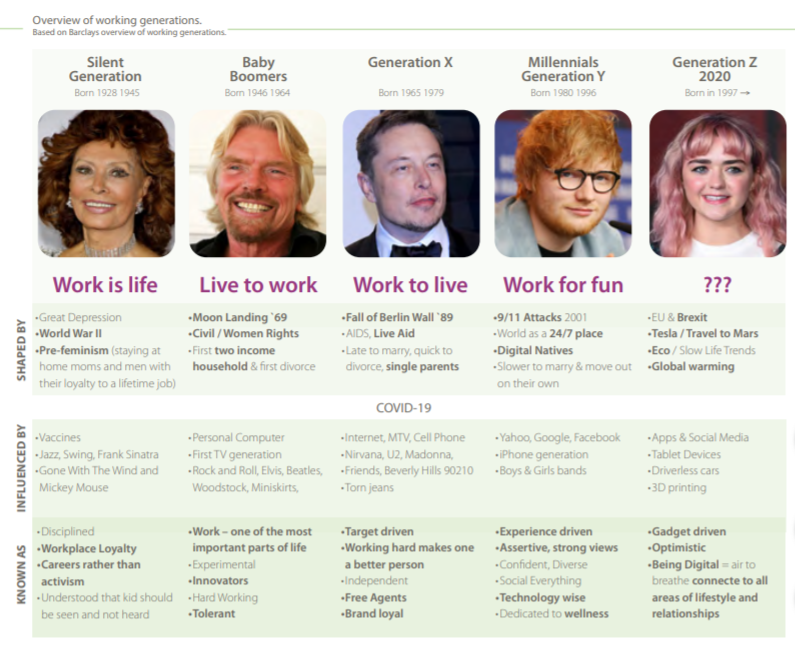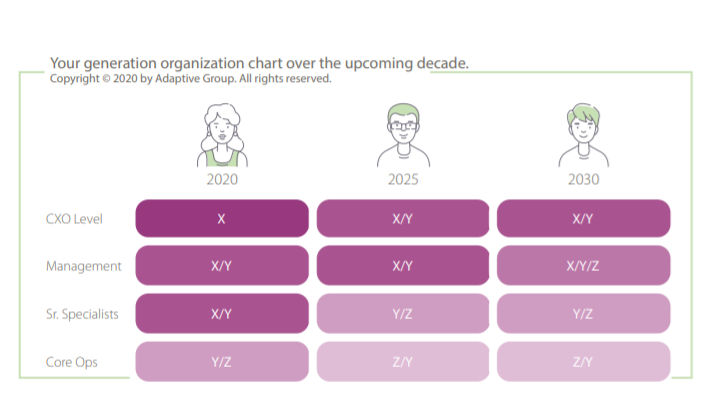
Posted on: Sep 21, 2020
Being aware of the natural richness of diversity, it is getting the most from it. Dear You, what would you do to change the World today? And why should You care?
“Hello, Year 2020! What is wrong with you?” Or trying to be more positive let us ask, “Dear 2020, what are you trying to tell us?”
We are living in the times of change. The recent studies1 prove that flexibility of professionals and managers is in high demand. The dynamic post-pandemic reality triggered the need of being adaptive to the new circumstances, also what matters is the trust culture. Majority of specialists and managers (93%) declare the easiness of working remotely. At the same time, they positively assess the self-effectiveness of delivered work (89%). When it comes to Organization’s communication strategy, 73% of respondents declare that they know their employers’ current strategy. However, it is worrying that every fifth of them does not know about it.
The trusting manager goes hand in hand with the engaged employee, and the company may only benefit here. Why? It is a matter of mutual interest and benefit. Flexible working hours and focus on delivered tasks. Trust culture, however, still a regular manager-reportee (face-to-face and remote) connection, promotes the idea of work-life integration for an Employee, and here are the main advantages:
- Enable staff to feel more in control of their working life
- A happier, less stressed workforce with positive impact on mental health,
- Wellbeing and lower absenteeism,
- Increased engagement & productivity
- Staff feeling valued and that their personal and/or family life is important.
Simultaneously here is a package of perks for the Business itself:
- Increased (retained) competitiveness & productivity
- Improved customer service & reaction on market conditions
- Greater employee loyalty, commitment, motivation, and retention
- Improved employer branding & top talent attraction
How do Organizations respond to this trend? Adaptive SAG is a boutique consulting company, founded in 2015, currently hiring >40 business service professionals. We mostly work on project-based assignments directly for our clients. The COVID-19 period showed that we are quite well prepared for these times. With adaptiveness attitude, supported with proper online systems in place we kept on working for and with our clients, plus it was a very good momentum to focus on the internal improvement initiatives with the full involvement of the entire team. What was crucial – especially in the lockdown times – we initiated this habit of regular online connections. The aim was to ask, “How do you feel?”, “Are you well?”. At the same, the Leadership Team kept the full transparency of the business situation and informed openly about upcoming steps. What we have learned later from our teammates was, “I felt connected”, “I trusted that the company will survive”, “Thanks to the transparency, I was not worried that I would lose my job”. Plus, we could simply see our faces. Together with releasing some lockdown restrictions, our office has been prepared and our employees have been given the choice between remote and office-based work, working in shifts. That solution worked very well.
Need for change. Still in 2019, as a young, still learning Organization we came up with a conclusion that we have so much in common being adaptive, however, we are different.
We observed that youngest colleagues (who have just recently entered the job market) were not fully following the working hours. The Leadership Team analyzed the situation and found out that nobody had instructed them on how to act. Having the majority of project-based activities, including the “home-office” mode for Project Managers, our colleagues could see them coming to the office during irregular hours, or not seeing them at all. Instead of putting more control in place, we have adopted the set of House Rules and deployed it within the team.
You may ask, what a big deal about it? Why was is necessary? Here is the answer, we believe any change we expect should start from ourselves, in this case from the Leadership Team. In fact, by listening to this group we – as Organization – could learn from them. The aim was not to strengthen control but to give clear instructions, reinforcing the rules. The transparency always wins.
It is a recommended direction also in bigger operational teams who very often miss proper guidance since their managers work remotely. At the same time, many managers do feel, they do not do their best due to lack of proper tooling or their management support. A quick, one-time change will not make any difference. Consequence and consistency do.
Was this a matter of having different generations aboard? The literature says: yes! Following the survey results2 conducted by the social research agency around understanding the impact of COVID-19 on the emerging generations, we observe that the opportunities and challenges of social isolation differ across generations.

Can we assume the same for the workplace? As per different sources, we do have 5 defined generations living nowadays. Let us look at them in the context of their attitude to work.³

There is a close connection4 between what shaped and influenced people by the events in their adulthood, so they are known as:
Silent generation who was claiming loyalty of lifetime job. Boomers felt more strongly that work should be one of the most important parts of a person’s life. Generation X believes working hard makes one a better person. Generation Y (Millennials) wants to work smart & play hard. The open question, I would leave you dear Reader with, is what is coming next with Generation Z?
So, do generations matter or not? And why should I care? Currently, we observe the representatives of 3 generation groups in the job market, X, Y and Z who is entering the workplace just now. The upcoming decade will bring the Generation Z from the entry-level to the level of your Leadership Team. Or perhaps sooner? Are you ready? Will people still get your message? Or you might feel misunderstood? In case you would be wondering, please look at the graph.

GENERATION, OR INDIVIDUAL ASPIRATIONS? Another point of view, I was recently inspired by Zyta Machnicka in her recent book and I would follow the statement she made, that trying to put people into a generation chart is a kind of illusion5, simply due to the fact we immediately tend tojump to conclusions and follow stereotypes. Here is one of them: Millennials are commonly known as tough to manage, accused to be entitled, unfocused, lazy, narcistic, self-interested.6 Do you agree?Who is guilty here? Their parents for telling them they can get anything, just because they want it. Technology and social media? Era of instant gratification or the environment, where the companies care more about numbers not people, no teaching them cooperation?
Instead of judging a book by its cover, it is important7 to: (1) see an individual as a human being, with her/his personality, moral code, own experiences, habits, feeling and emotions. Also, 2) to understand at which stage of someone’s job journey the person is (so called PDF8). It is quite logical that you have different needs and expectations when you start your professional adventure, here you are mostly interested in gaining experience, learning from your more experienced colleagues and bosses, getting the most thrilling assignments to live your life to the fullest. Once reaching the next stage, i.e. maturity level, you keep on growing in your role, but you also turn into direction of compering yourself with other peer colleagues, very often your decisions are being influenced by the strong need of financial stability and the time you can devote or not to your closest. When you enter the third stage of your professional journey, the most preferable scenario would be to reap the benefits and enjoy the industry respect and esteem. At the same, while changing jobs, despite your huge knowledge, experience, and skillset, you would be fearing being outcasted and useless.
All that sounds reasonable, different needs at different states of your professional lifecycle.
Understanding before judging. „OMG this person is from another space!”, “She is lazy”, “He is so entitled, thinks the world will revolve around him! “I am not getting her way”, etc. Sounds familiar? How often do you happen to ask such questions while having conversations with your teammate? Or how often do you ask yourself such questions while interacting with a younger or older coworker, or employee?
Give it a try and understand first, without judging. Why? To learn. Be a benchmark as the learning Organization, where people are not afraid to admit that they do not know something, where people cooperate and share their successes and failures. The knowledge and skillset come with the experience, bad and good.
So, what is the conclusion Chef? Learn from our less experienced colleagues. Using the advantage of their fresh point of view, being open to talk, share opinion, even if very often controversial.
There is no Company Culture without people. Following Simon Sinek’s, it goes with the whole package of company reputation, people engagement (trust and cooperation) that leads to productivity and company growth.9
So, what would you do to make this World a better place to live? Your move, Chef!
____________
[1] „Flexibility of professionals and managers in times of change” report by Cushman & Wakefield & Antal, July 2020.
[2] „Understanding the impact of COVID-19 on the emerging generations” report by the social research agency McCrindle
[3] Based on Barclays overview of working generations. “Talking about my generation:
Exploring the benefits engagement challenge, Barclays Corporate and Employer Solutions, Sept 2013”
[4] Ibidem.
[5] Zyta Machnicka „Lepszy pracodawca. Jak autentyczny employer branding zmienia biznes rynek pracy i ludzi.”, Wydawnictwo Helion 2020, pages 57-59.
[6] Simon Sinek „Millennials in the Workplace”, YouTube.
[7] Z. Machnicka, op.cit. pg. 57-58.
[8]Z. Machnicka, ibidem, PDF as Beginning, Maturity and Finish („Początek, Dojrzałość i Finisz”)
[9] S.Sinek, op.cit.
Magdalena Bugajska, Senior Manager / Senior Consultant Adaptive Group
Article originally published in the Outsourcing & More magazine, issue 54 (pages 20-22).
